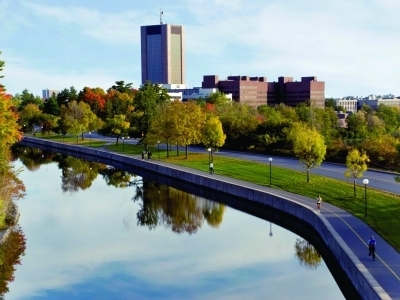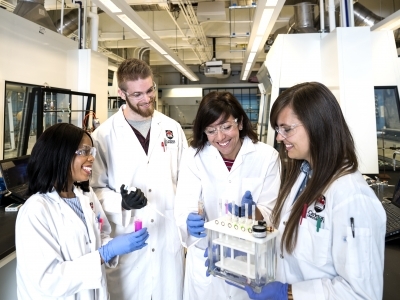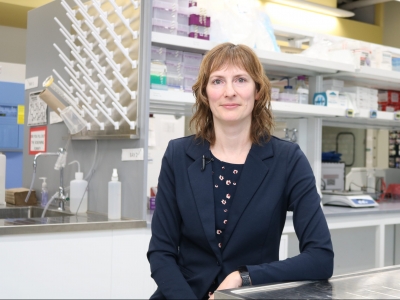Bridget Steele, a Master’s student in International Affairs, won a ThinkSwiss scholarship that allowed her to spend three months in Switzerland at the Swiss Federal Institute of Technology (ETH) in Zürich. Steele says: “The ThinkSwiss award is like the Swiss version of the Fulbright and allows North American Students to conduct research in Switzerland.” Here she blogs about her experience.

Why does living in Switzerland seem to make people so happy?
After three months of conducting quantitative research in the Center for Security Studies at the ETH Zurich the importance of drawing conclusions based on strong evidence and rigorous data analysis became ingrained into my thinking and problem solving. However, when asked by family and friends at home what living in Switzerland was like I would immediately respond with, “the people are happy”. Did I have, or even try to find, any conclusive evidence to back up this statement? No. So why was I so confident in my claim? A reflection on my experiences, interactions, and observations in Switzerland have allowed me to identify three main reasons why I believe people in Switzerland seem to be just generally happy.
1. High quality of life… for everyone
Living in Switzerland is expensive, and living in Zurich is crazy expensive when compared to my home country of Canada. Rent, food, transportation, events… you name it and the prices are astronomical. But was anybody complaining? Not that I heard. Salaries in Switzerland are high, and not just in comparison to Canada. They are high even when considering the cost of living in Switzerland. And it is not just the bankers or scientists or doctors that are making good wages. The person at the checkout at the grocery store, the person taking your ticket on the train, the person serving you at a restaurant, the person cutting your hair, and the person admitting you to a museum are all earning wages that not only allow them to survive but that give them the opportunity to live a comfortable life. When people can live a life free from stress about how they are going to afford to eat, have shelter, or look after their children, they are more productive, healthier, and yes, happier. So, did I mind paying high prices? Absolutely not. I am certainty not the first person to comment on the reliability, cleanliness, and efficiency of Swiss life. I know that high prices allow workers to offer high quality service making me, the consumer, happier. I also know that the high prices allow workers to live a dignified life, making them happier.
2. Proximity to outdoor activity
What do Swiss people do on the weekends? Hike a mountain in the summer or ski a mountain in the winter. Research has shown that exposure to awe inspiring landscape improves health and well-being. In fact, connection to the outdoors has even been shown to have medicinal effects. Research has also shown that physical activity improves quality of life. So being in the alps seems to be a match made in heaven for leading a healthy active lifestyle. There is no shortage of unfathomably high mountain ranges, pristine lakes, beautiful flora, and well-marked trails making it next to impossible to avoid the positive impact of the Swiss scenery and environment.

3. Privacy and collegiality
What do Phil Collins, Shania Twain, Tina Turner, and James Blunt all have in common? Besides being world famous musicians, they are all celebrities who have chosen to make Switzerland home. Why? Swiss people value privacy so highly that even the rich and famous can walk down the street without swarms of people following them. I was very surprised to have my own celebrating viewing and spot Justin Bieber playing in a game of soccer near the lake in Zurich one afternoon this summer. So how does this impact everyday people? In an age of the internet, free access to information, social media, and oversharing, it is very easy to become overwhelmed and anxious about what others think of you or worried about curating a certain image of yourself. In Switzerland, however, people respect each other’s privacy and allow people to go about their daily business without the added stress of worrying about public perception. Interestingly though, people do not come off as unfriendly or unhelpful. Everyday my colleagues and I ate lunch together and enjoyed both a morning and afternoon coffee. I felt extremely safe in the city and despite at first not being able to speak a word of Swiss German, everyone on the streets and in the stores, were willing to help me if needed. The thoughtfulness and the hospitality of the Swiss people that I observed combined with the respect they show to others must contribute to making people in Switzerland happy.
Having the opportunity to live in Zurich for three months and explore the rest of the country on the weekends was a once in a lifetime opportunity for me. The Center for Security Studies is a first-class organization with highly knowledgeable and skilled researchers from all over the world, who are extremely supportive and encouraging. My supervisor Dr. Enzo Nussio and the Director of the Center, Dr. Andi Wenger, gave me the autonomy to conduct interesting and relevant research on the psychological and societal impacts of terrorism, while also teaching me valuable skills and techniques that I can use going forward in my doctoral studies. I have no doubt that the ThinkSwiss scholarship provided me with an opportunity to grow as an individual and researcher, contribute to a field that I am passionate about, and make life long connections, and for that I am truly grateful.
If you are interested in applying for the ThinkSwiss Research scholarship, you must do so by Jan. 15, 2018.
Monday, November 27, 2017 in Awards, News, Research
Share: Twitter, Facebook



